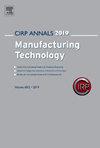通过几何控制加速3d打印PETG骨组织支架的降解
IF 3.6
3区 工程技术
Q2 ENGINEERING, INDUSTRIAL
引用次数: 0
摘要
支架在骨修复中起着关键作用,其降解速率应与骨再生速率相匹配。然而,骨组织支架的缓慢降解是一个主要的挑战。本研究考察了不同铺层模式(0/45、0/60/120和0/90)打印的聚对苯二甲酸乙二醇酯(PETG)骨组织支架的降解率。考虑到打印路径长度、结晶度和纤维接触点的变化,利用设计知情的加工条件探索降解动力学。研究结果表明,在保持压缩模量的同时,改变支架铺设可使降解率提高高达50%。该研究为控制支架的降解速率和力学性能提供了一种新的不依赖于材料的方法。本文章由计算机程序翻译,如有差异,请以英文原文为准。
Accelerated degradation of 3D-printed PETG bone–tissue scaffolds via geometrical control
Scaffolds play a key role in bone repair and should have a degradation rate that matches the rate of bone regeneration. However, the slow degradation of bone tissue scaffolds is a major challenge. This research investigated the degradation rate of Polyethylene terephthalate glycol (PETG) bone-tissue scaffolds printed with different lay-up patterns (0/45, 0/60/120, and 0/90). Degradation kinetics were explored using design-informed processing conditions, considering variations in the printing path length, crystallinity and fibre contact points. The findings revealed that changing scaffold lay-up increased the degradation rate by up to 50 % while maintaining compressive modulus. The research contributes a new and novel material-independent approach for controlling scaffolds degradation rate and mechanical performance.
求助全文
通过发布文献求助,成功后即可免费获取论文全文。
去求助
来源期刊

Cirp Annals-Manufacturing Technology
工程技术-工程:工业
CiteScore
7.50
自引率
9.80%
发文量
137
审稿时长
13.5 months
期刊介绍:
CIRP, The International Academy for Production Engineering, was founded in 1951 to promote, by scientific research, the development of all aspects of manufacturing technology covering the optimization, control and management of processes, machines and systems.
This biannual ISI cited journal contains approximately 140 refereed technical and keynote papers. Subject areas covered include:
Assembly, Cutting, Design, Electro-Physical and Chemical Processes, Forming, Abrasive processes, Surfaces, Machines, Production Systems and Organizations, Precision Engineering and Metrology, Life-Cycle Engineering, Microsystems Technology (MST), Nanotechnology.
 求助内容:
求助内容: 应助结果提醒方式:
应助结果提醒方式:


